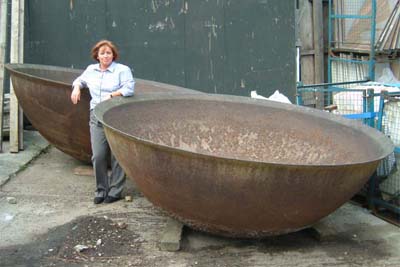Archived Stock - This item is no longer available
An enormous cast iron sugar boiler
the dish with an everted rim, indistinctly stamped "Carron",
SOLD OUT
Out of stock
This enormous vat cast in Scotland (one of two, the smaller of the two, stamped "Carron", sold recently to The Falkirk Museum) is believed to have been brought back to the UK by Sir Peter Runge, former chairman of Tate and Lyle. Sugar boilers were made for export to the West Indies and Central America for use on the Plantations at the beginning of the sugar cane refining process. A chain of successively smaller boilers would be used to reduce the cane before shipping the pulp into Liverpool for refining in Britain. These indestructable dishes can still be seen on and around Carribean plantation houses - usually planted up. LASSCO could find no other examples in this country. They bear a poignant testament to the industrial methods of the colonial age.
Carron Co. was founded in 1759 near Falkirk in Scotland. Like Coalbrookdale they became an enormous operation. When Thomas Pennant visited the works in 1769 he described them as "the greatest of the kind in Europe....Above 1200 men are employed. Cannon and all kinds of casting produced". Carron were primarily interested in the mass production of their most commercial lines and had agents in London spotting the latest fashions and sending plaster casts to Falkirk for reproduction. LASSCO St. Michael's has bought and sold a number of Georgian fire grates stamped "Carron" or "Ca.Co" over the years, but these are the first sugar boilers!

